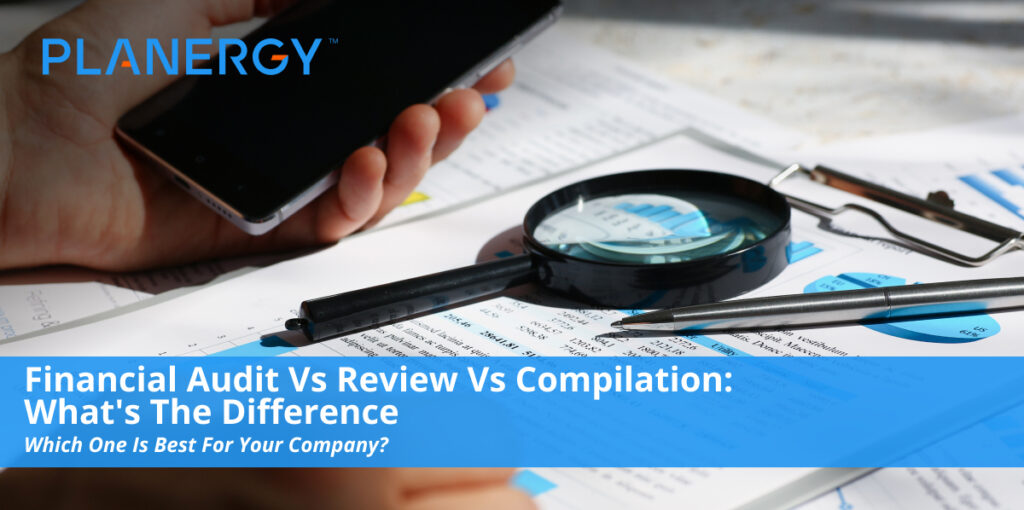You’ve worked hard to get your business running, and you’ve grown so much that you’re ready to move from a small leased space to a building of your own.
You’ve met with your lenders and you have preliminary approval, but the bank needs to see your financial statements before the loan can be approved and you can receive the funds.
You’ve been on top of your financial records because you know how important it is to keep track of all of the data. It helps you see how well your business has performed and your financial position, which drives your business decisions.
You know that you can prepare your financial statements in house, but now that you’re expanding, you feel it’s better to have someone else, with experience in Generally Accepted Accounting Principles (GAAP) or International Financial Reporting Standards (IFRS), prepare your financial statements for you.
If you’re already using a certified public accountant (CPA) to handle your general accounting or bookkeeping and tax returns, you can also have them prepare your financial statements, and perform the services you need to meet your bank’s requirements.
It is worth noting, however, that not all accountants are CPAs, and only licensed CPAs are eligible to perform certain services.
When choosing the level of service you want a CPA firm to provide your organization, it’s important to understand the level of assurance that comes with each report.
This is crucial for determining whether the service meets your needs as a company or meets the expectation of the people using your financial statements. CPA firms can provide three levels of service with your financial statements: audit, review, and compilation.
Financial Audit
The financial audit provides the highest level of assurance that your financial statements are free of material misstatement. Under an audit, the CPA firm has to obtain an understanding of your internal controls and assess the fraud risk.
It is also necessary to cooperate figures and disclosures that are included in the financial statements by obtaining audit evidence through physical inspection, third-party confirmation, observation, examination, analytical procedures, and more.
Because of the amount of work that’s required to be performed, the audit is usually substantially more expensive than a review.
A full audit enables the to obtain reasonable, (high but not absolute assurance) about whether the financial statements are free of material misstatement.
The CPA has to express their opinion on whether the financial statements are presented fairly in all material aspects and in accordance with the applicable financial reporting framework.
They are also required to report on the financial statements in accordance with their findings. The CPA has to be independent in this scenario.
Beyond the formal report that the CPA issues, the CPA must report to you any significant or material weaknesses in your system of internal control that they find during the audit.
By becoming aware of internal control weaknesses, you may improve the way you conduct business.
Outside parties, such as investors, banks, and creditors usually require audits. It is best practice to have an audit prior to selling a company to ensure that the financial information presented is materially accurate and can withstand financial due diligence.
Misstatements are differences between a reported financial statement item and that which is required for the item to be reported in accordance with the applicable financial reporting framework. A misstatement is usually the result of error or fraud. A material misstatement is a misstatement that is severe enough to cause a user to form an incorrect conclusion about the financial statement.
Financial Review
When comparing an audit versus a review, the conversation is often centered around the cost. Generally, a review costs less than an audit and is often seen as the preferred option. This is especially true for high-growth companies in the early stages operating with limited capital.
The issue is that a review only provides a limited assurance and is significantly narrower in scope compared to an audit. The CPA firm designs and performs analytical procedures, inquiries, and other procedures only deemed necessary based on its understanding of the client and the client’s industry.
Reviews do not include investigations of the entity’s internal control system or its fraud risk, which may be an area of interest for bankers and investors who are providing money to a growing company.
In a financial review, the CPA issues a formal report that includes a conclusion about whether based on the information in the review, they are aware of any material modifications that should be made to the financial statements in order for them to be compliant with the applicable financial reporting framework.
A review engagement does not include testing accounting records or other procedures that would normally be performed over the course of a financial audit. A common misconception is that a review is a first step that is easily converted into an audit the following here but that is not the case.
Ultimately, reviews are an effective option for companies that are comfortable with limited Insurance given in reports and who expect to stay at the review level for a period of time.
For instance, if a company hires a CPA firm to perform a review for the 2018 fiscal year and for 2019 decides to move to an audit, the firm is required to perform audit procedures on the 2018 balance sheet in order to issue its audit report for the fiscal year 2019.
The company may wonder why it’s necessary to look at 2018 again because they already did the work last year. If this discussion occurs after the review has been delivered clearly the client did not understand the Assurance limitations of the review and the CPA firm did not correctly advise the company.
To issue an opinion on the 2019 income statement, a CPA firm has to audit both the 2018 and 2019 balance sheet to ensure the proper cut off of Revenue and expenses. Because of the review level procedures performed in 2018, the CPA firm is required to perform testing of accounting records and audit-related procedures on the 2018 balances.
These additional procedures on the 2018 balance sheet likely increase the cost of the first-year audit and then combined with the fee for the review of 2018 did ultimately result in higher costs over the two-year period ending in 2019.
What this means is that a company should hold an in-depth discussion before a CPA firm initially and gauges with the company to ensure that there is sufficient value in performing a review or determine whether a different option such as an initial balance sheet audit for 2018 would be better in the long run.
A financial review is generally appropriate as your business grows and is looking for larger and more complex levels and financing and credit. It is also useful when the business owner is speaking better confidence in financial statements when it comes to evaluating results and making important business decisions
Financial Compilation
When comparing a review vs compilation, it may be tempting to go with the compilation based on price.
During a financial compilation, the CPA prepares a company’s financial statements using the company’s source documents. There is no reasonable assurance on the figures presented in the financial statements because the firm conducts no testing, analytical procedures, or inquiry on the figures.
The CPA firm does not have to be independent to perform this level of service. A compilation is the lowest cost option for an organization because it takes the least amount of time for a CPA firm to perform.
Because of this, a compilation should only be used in simple situations such as when management needs assistance in presenting the company’s financial information in the form of financial statements. Compilations, however, are not often a viable option for a company because it provides little value.
Many people who use a company’s financial statements, specifically investors and bankers, will generally require some assurance given by a CPA firm on the figures presented in the statements.
When making the choice between an audit or a review, consider your needs alongside the needs of your creditors and investors.
Proper planning and discussions with your team and a qualified CPA firm is an important part of making the right decision for your company so that you can get your needs met in a cost-effective manner.




